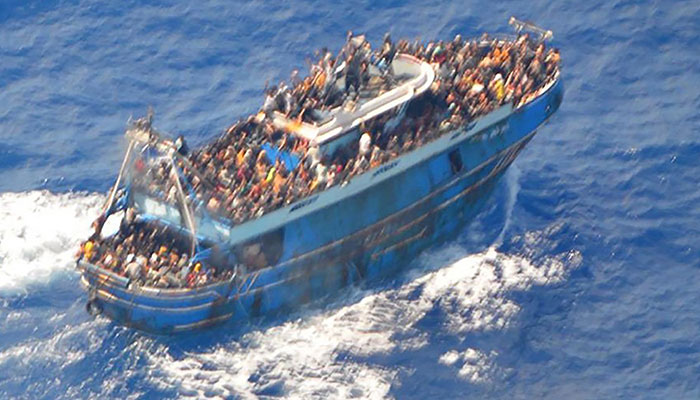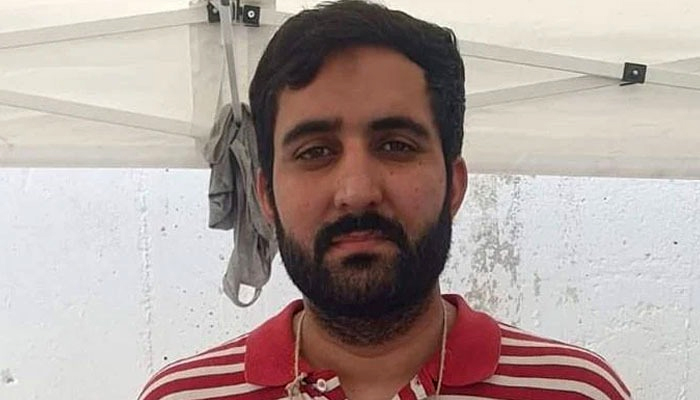Greece boat tragedy: a survivor’s tale
Usman Siddique is among the 12 Pakistanis who survived the deadly voyage
ISLAMABAD: He swam in distress, foam shoes and a piece of wood his only source of support while the crew of a naval ship saw people drown in the sea for 3-4 hours before it tried to rescue them.
Usman Siddique is among the 12 Pakistanis who survived the deadly voyage he and so many others had taken in search of a better life in Italy; the fishing boat they were on capsized off the Greece coast on June 14. Usman is the only one who has returned to Pakistan, the remaining 11 Pakistanis having opted for asylum in Greece. Usman’s story -- as narrated to the FIA -- contains harrowing details of torture carried out by agents, their refusal to provide sufficient food, and the apathy shown by the passing ships and maritime forces of European countries.
Usman has told the FIA that not only were the intending migrants forced to starve while kept in cramped buildings in Libya, there was no arrangement of food in the fishing boat either where they remained stranded for five days before it sank. Against its holding capacity of 350 passengers, as many as 750 people were boarded onto the fishing boat. Two of those onboard died of hunger hours before the boat capsized, says Usman.
A constable in the Punjab police, Usman is from district Gujrat, an area from where many are settled in Europe. Together with four of his friends -- Ali Raza, Shoaib Akhtar, Zeeshan Mustafa and Bilal Afzal -- Usman too decided to try his luck abroad. Muhammad Usman, another friend, connected them with the ‘agents’. Each of the men paid Rs2.4 million as advance. On May 3, they were flown to Dubai from where they took the next flight for Alexandria (Egypt). Upon landing there, they were moved by private individuals to a small plane filled with 130 passengers – all intending migrants.
The flight landed at BenGhazi airport in Libya and the migrants were taken away to a safe house. “We were kept in a small room where we could only sit. We were a hundred people”, recalls Usman to the FIA. The next day, Usman and his friends were shifted to another safe house where 35 Pakistanis were kept in one room. They remained detained there for 25 days, in a space where “the residential facilities were literally non-existent” and where they “were offered food with a break of two days.”
They were then moved to Tobruk after the agents made sure that the money promised to them had been received in Pakistan by their authorized representatives. Asif Sanyara’s farmhouse in Tobruk was their next destination, a place where 356 Pakistanis were kept. Ashrafi Libbi, a Libyan partner of Asif Sanyara, was running this safe house. He was in the Libyan Navy and his son, Noori, was also deputed there. The food provided there was insufficient for the needs of the migrants. “Noori and two Sudanese [individuals] would commit torture if someone complained of food”, says Usman in his FIA statement. Even there, food was given every second day.
After spending some days there, they were boarded in a cramped container – 200 migrants – and driven to a place near the sea on the night of June 8. Usman’s other friends were not with him as he headed for a fateful journey. Through a speed boat, they were taken to a spot where the fishing boat was parked in the sea. The fishing boat had come empty from Egypt; its pilot and mechanics were also migrants. Migrants from Egypt, Lebanon and Syria also assembled there -- a total of 750 to be boarded in a boat that could hold only 350. Children and women were also on board.
It took three days for the boat to pass through the waters of Turkey. On the fourth day, June 13, the pilot turned off the engine as a matter of strategy, so that the coastal guards would rescue them. None came. Yet another day passed. There was no food on the boat. The migrants had been starving for five days now; two of them had died of hunger. In the meanwhile, the pilot tried to contact the maritime forces of Germany, France and Italy -- all in vain.
On the sixth day, a helicopter flew over the boat, took its picture and went away. Hours later, a German cargo ship neared the boat; German forces were on board. It threw bread and bottles of water into the fishing boat and went back. The women and children in the boat cried for help -- again, all in vain. Then a ship appeared from the side of France at night. It delivered two drums of oil and water but didn’t offer any help beyond that.
On the night of June 14, a naval ship headed towards the boat. Upon seeing it, the pilot of the boat first gave a red and then a green signal. At this, the naval ship came close to the boat and tried to pull the boat which capsized instead. It took a total of two minutes for the boat to sink. Meanwhile, the ship started moving away from where it saw migrants drowning in the waters.
Usman knew how to swim, employing the help of foam shoes and a plank of wood. It took three hours for the naval ship to start rescue work and somehow save 100-200 people, including Usman.
The rescued migrants were shifted to an Italian ship, which dropped them off on the shores of the Greek city of Kalamata. According to Usman’s statement, during this journey too the survivors were offered neither any food nor any medicine.
-
 The Pope Breaks His Silence On Iran Attacks: Breaking
The Pope Breaks His Silence On Iran Attacks: Breaking -
 US On High Alert After Overnight Joint-military Strikes On Iran: FBI
US On High Alert After Overnight Joint-military Strikes On Iran: FBI -
 Prince William 'frustrated' By Delay In Major Move Against Andrew
Prince William 'frustrated' By Delay In Major Move Against Andrew -
 BLACKPINK's Rose Makes K-pop's History With Major Win
BLACKPINK's Rose Makes K-pop's History With Major Win -
 Noel Gallagher Gives Shut-up Call To Critics After Receiving BRIT Award
Noel Gallagher Gives Shut-up Call To Critics After Receiving BRIT Award -
 Pentagon Used Anthropic’s Claude AI In Iran Attack Despite Ban: Report
Pentagon Used Anthropic’s Claude AI In Iran Attack Despite Ban: Report -
 Nvidia Teams Up With Telecom Firms For AI Driven 6G
Nvidia Teams Up With Telecom Firms For AI Driven 6G -
 SpaceX Launches 25 Starlink Satellites On Its Falcon 9 Booster From The West Coast
SpaceX Launches 25 Starlink Satellites On Its Falcon 9 Booster From The West Coast -
 Expert Reveals What Makes Investigations Hard In Search Of Savannah Guthrie Mother Nancy: 'Silent Witness'
Expert Reveals What Makes Investigations Hard In Search Of Savannah Guthrie Mother Nancy: 'Silent Witness' -
 'SNL's Strongly Reacts To BAFTA's Racial Slur With Tourette’s Sketch
'SNL's Strongly Reacts To BAFTA's Racial Slur With Tourette’s Sketch -
 Austin Shooting Leaves Multiple Dead, Dozens Injured
Austin Shooting Leaves Multiple Dead, Dozens Injured -
 Meghan Markle Friends Break Silence As Duchess Plan To Return To UK
Meghan Markle Friends Break Silence As Duchess Plan To Return To UK -
 Dua Lipa Stuns Everyone On And Off Stage At 2026 BRIT Awards
Dua Lipa Stuns Everyone On And Off Stage At 2026 BRIT Awards -
 2026’s Most Visited Websites Revealed: ChatGPT Overtakes Major Platforms
2026’s Most Visited Websites Revealed: ChatGPT Overtakes Major Platforms -
 Worst Cricket Moments That Shocked The Game
Worst Cricket Moments That Shocked The Game -
 Prince Harry, Meghan Markle Reach A Crossroads: ‘You Could Lose Everything’
Prince Harry, Meghan Markle Reach A Crossroads: ‘You Could Lose Everything’





